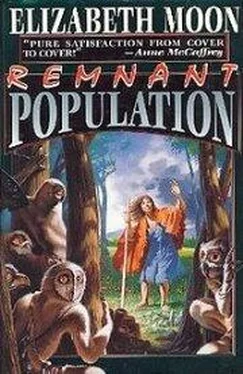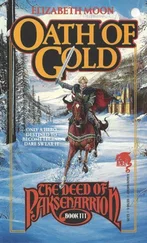Remnant Population
by Elizabeth Moon
To Betsy, who provided the spark, and Mary, Ellen, and Carrie who responded with warmth and light.
This book had a number of godmothers, both old and new. Its literary antecedents include an essay by LeGuin, The Wall , by Marlen Haushofer, and a book I had not yet read (but heard about) when I began it, Two Old Women , by Velma Wallis, and those folktales in which wise old women know something worth learning. But it could not have been written without the living experience of women much like Ofelia, from whom I learned much less than I should have. They are too many to name, but they should not be forgotten. Lois Parker helped in revision, especially her willingness to share her own experience of a long life.
Sims Bancorp Colony, File #3245.
Between her toes the damp earth felt cool, but already sweat crept between the roots of her hair. It would be hotter today than yesterday, and by noon the lovely spice-scented red flowers of the dayvine would have furled their fragile cups, and drooped on the vine. Ofelia pushed the mulch deeper against the stems of the tomatoes with her foot. She liked the heat. If her daughter-in-law Rosara weren’t within sight, she would take off her hat and let the sweat evaporate. But Rosara worried about cancer from the sun, and Rosara was sure it wasn’t decent for an old woman to be outside with nothing on her head but thinning gray hair.
Not that it was so thin. Ofelia touched her temples, as if to tuck an errant strand in place, but really to confirm the thick strands of the braid she wore. Still thick, and her legs still strong, and her hands, though knotted with age and work, still capable. She eyed her daughter-in-law, at the far end of the garden. Scrawny, hair the color of scorched paper, eyes of mud. Thought she was beautiful, with her narrow waist and her pale hands, but Ofelia knew better. She had always known better, but Barto would not listen to a mothers wisdom, and now he had Rosara of the narrow body — like a snake, Ofelia had said once only — and no children.
She minded that less than the others thought. She could have welcomed a daughter-in-law independent enough to refuse children. No, it was Rosara’s determination to enforce on her mother-in-law all the petty rules intended to preserve the virtue of virgins… that she could not tolerate. “We should have planted more beans,” Rosara called. She had said that at planting, knowing that Ofelia could not use all the beans she normally grew. She wanted Ofelia to grow beans to sell, as well as beans to eat.
“We have enough,” Ofelia said.
“If the crop does not fail,” Rosara said.
“If the crop fails, a bigger crop would be a bigger failure,” Ofelia said. Rosara snorted, but did not contradict. Perhaps she was finally learning that it did no good to argue. Ofelia hoped so. Ofelia went on working on the tomatoes, pushing the mulch here and there, tying up straggling ends of the vines. Rosara claimed the tomato vines made her skin itch; she stayed away from them. Ofelia hunkered down to hide a smile as she thought of this, enjoying the strong green tomato smell.
She dozed off, there among the tomatoes, rousing only when the slanting afternoon light probed between the rows. Light in her eyes had always waked her; she was still sure she had not slept at all in the cryo tanks because the lights stayed on all the time. Humberto had said that was ridiculous, that no one was awake in cryo, that was the point. Ofelia had not argued, but she was sure she remembered the light, always stabbing through her eyelids.
Now, lying drowsy on the crumbly mulch between the rows of tomatoes, she thought how peaceful it looked, that little green jungle. Silent, too, for once; Rosara must have gone back inside without noticing she was asleep. Or perhaps the bitch didn’t care. Ofelia rolled the insult on her tongue, silently, savoring it. Bitch. Slut. She didn’t know many such words, which gave the few in her vocabulary extra richness, all the anger that some people spread over many words on many occasions. Bartolomeo’s voice in the street cut across her reverie, and she sat up as fast as she could, hissing at the pain in her hip and knees.
“Rosara! Rosara, come out!” He sounded excited or angry or both. He often did. Most of the time it was nothing, but he would never admit it, even afterwards. Of all her children, Barto was the one Ofelia had liked least, even in infancy; he had been a greedy nurser, yanking on her nipples as if she could never be enough for him. He had grown from greedy infancy to demanding childhood, the son whom nothing satisfied; he had quarreled incessantly with the other children, demanding fairness which always meant his benefit. In manhood he was the same, the traits she had liked least in Humberto magnified ten times. But he was her only living child, and she understood him.
“What?” Rosara sounded snappish; either she had been napping (something Barto and Ofelia both disapproved of) or working on her computer.
“It’s the Company — they’ve lost the franchise.”
A shriek from Rosara. It might mean that for once Barto was upset about something worth the trouble, or it might mean that she had just found a pimple on her chin. With Rosara, it might be either, or anything in between. Ofelia struggled to her knees, then, with a hand on a tomato stake, to her feet. Her vision grayed slightly and she waited for it to come back. Age. Everyone said it was age, and it would get worse. She didn’t think it was that bad, except when people wanted her to hurry, and she couldn’t. “Mama!” Barto, bursting out the kitchen door into the garden. Ofelia was glad to be upright and obviously working; it gave her a tiny bit of moral leverage.
“Yes?” She had spotted a fat caterpillar, and when he loomed over her she had it fast in the loop. “See?”
“Yes, mama. That’s nice. Listen, its important—”
“A good crop this year,” Ofelia said.
“Mama!” He leaned over, pushing his face into hers. He looked more like Humberto than anyone else, yet Humberto had had gentle eyes.
“I’m listening,” she said, putting out her hand to the tomato stake again.
“The Company’s lost the franchise,” he said, as if that meant something. “The Company’s lost the franchise,” Ofelia repeated, to prove she’d been listening. He often accused her of not listening.
“You know what that means,” he said impatiently, but then went on to tell her. “It means we have to leave. They’re yanking the colony.” Rosara had come out of the house behind him; Ofelia could see the patches of red on her cheeks.
“They can’t do that! It’s our home — !”
“Don’t be stupid, Rosara!” Barto spat onto the tomato plants, as if they were her body; Ofelia flinched, and he glared at her. “Or you, mama. Of course they can make us leave; we’re their employees.” Employees who never got paid, Ofelia said to herself. Employees with no retirement, no medical benefits except what they produced for each other. Employees who were supposed to support themselves and produce a surplus. Not that they had produced the regular shipments of tropical woods that they’d been assigned… it had been years since they’d had enough adults to continue logging. “But I worked so hard!” Rosara wailed. For once Ofelia agreed with her; she felt the same way. She looked sideways at the tomato plants, avoiding Barto’s glare, focussing on the fringed margin of the leaves, the tiny hairs bristling from the stems. The first flower buds hung like little chandeliers, still folded tight, ready to open in the light, take fire, and -
Читать дальше












